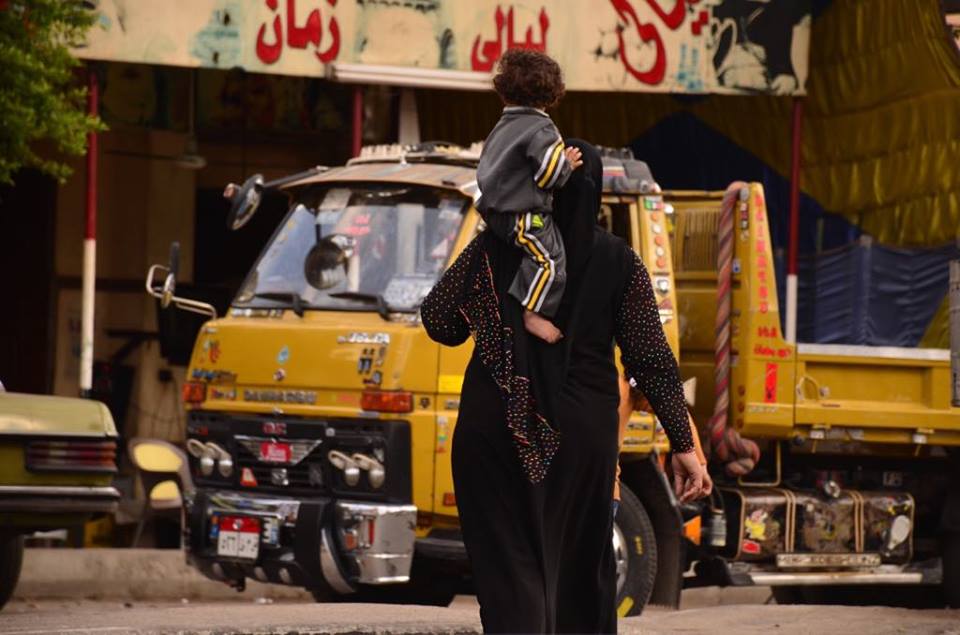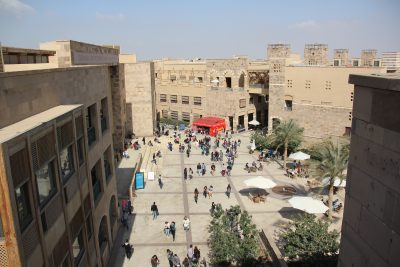Women in ‘Men’s Clothes’ Challenge Traditional Gender Roles
Women ‘In Labor’
By: Laila Sherif Said
Follow @lailasherifs
Egyptian women who taken on jobs “made for men” and become their families’ breadwinners say they face social bewilderment at best, verbal harassment at worst.
Badaweya, for example, has been working at her slaughterhouse as a butcher for the past 30 years.
“I grew up to be a butcher just like my mother and my father, and my children are now working with me. It’s my one and only source of income,” she said.
Badaweya told The Caravan that she is comfortable with her womanhood in such a male-dominated work environment.
“Why would I feel sorry for my femininity? Here I am,” she said.
She has broken the social mold but many others, however, have faced questions about their femininity for breaking the mold and at time, questioned it themselves.
THE DRUMMER
Donia Samy, 22, started playing the tabla at the Darb Al-Ahmar Artistic School in 2011, after she posted a two-minute long video of her first solo on Facebook.
Since only men are known to play the tabla professionally, her post sparked controversy on the social media platform.
Samy was immediately sucked into a vortex where she was pressured into finding something more “feminine” or “delicate” to do.
Her parents accepted her interest in the instrument, passing it off as a trivial, short-lived hobby that will eventually fade.
But it soon turned into a full-fledged profession and she was later hired to perform for shows.
“Everyone would ask me where I’d find a job with such a practice and tell me I’d be better off studying something more delicate and refined like the piano and violin,” Samy said.
THE PLUMBER
Seham Moghazy, also known as Om Bassam, is a 65-year old plumber.
“It started 17 years ago, after my husband and I separated and I realized I was all alone,” Moghazy told The Caravan.
At the age of 47, she reached out to the Aga Khan Network Development in Cairo for training workshops, which told her they only offered plumbing training for men at the time but that they would introduce some for women later on.
When she returned two months later, they were still offering plumbing courses for men.
“By then, I couldn’t take no for an answer because I couldn’t stay unemployed any longer,” she said.
Her children disapproved at first and were ashamed of her profession, until one day during a sewage crisis in the neighborhood, one of the neighbors called for her help at two a.m.
“It was then that they felt their mother was doing something important, it was then that they felt their mother was doing something good,” she told The Caravan.
Today, she has her own plumbing workshop.
THE WALL PAINTER
Sabah, also known as Om Amr El Na’asha, is a 62 year old wall painter.
Om Amr hails from a modest background. Her father had a simple menial job as a shayyal, a porter who carries luggage for others.
“One day, I got into a fight and someone threw acidic water at me, causing permanent damage to my face and neck. But I had to feed my kids some way… And so I’m a wall painter now,” she said.
Growing up, she was always inclined to home improvement types of work. She was also curious about what men do and wanted to see where the limits of their capabilities compared to those of women.
As a child, she would shave off her head and wear men’s pajamas, then as soon as she moved into a one-bedroom apartment, she changed her name to Mansour and started to imitate the deep voice of men.
All of these efforts were done in the hopes that people would not view or treat her according to her gender.
However, she was still constantly asked what her real name was and faced pressure by those who wanted to prove she was a girl, but she kept insisting that her name is Mansour.
Years later, she opened up to one of her colleagues after developing feelings for him, and with time, they got married and had three children.
THE ‘AHWAGEYA’
Om Karim works at the local coffee shop, which are male-dominated in Egyptian society.
Having to replace her husband who developed problems with his eyesight that left him unable to work, she now works at the same coffee shop where he was a waiter.
“The first year was tough when I first came to work,” Om Karim said.
“Even my daughters had issues with me walking around with a tea tray [and serving strangers].”
But Om Karim had one motto she repeated and would always stand by: “there is no shame in working”.
“You know, while working at the coffee shop, you have to be ‘a man’. Really. No flirting, no laughing, nothing of that sort,” Om Karim said.
THE CARPENTER
“When I first started the job I really loved it because I felt it was a form of art,” Asmaa, a carpenter based in the Abdeen district in Cairo, told The Caravan.
“There were many comments from people when I first started working here, especially due to the fact that Abdeen is a traditional area, so it is difficult for people to see and accept the fact that a woman was there working on the street,” Asmaa said.
She had heard of a number of people who had broken this gender barrier and therefore it never occurred to her that she could not work as a carpenter.
“I don’t think concepts such as ‘male jobs’ and ‘female jobs’ exist in our society anymore,” Asmaa said.
“The femininity you are talking about is an exterior – just an image. When we talk about the loss of these women’s womanhood, we are only talking about an exterior image,” Medhat, a fellow carpenter, told The Caravan.
THE TAXI DRIVER
“To be honest, at first, I was obliged to do this job to provide for my family. Now, the taxi has become a part of me,” Nour said.
As with Om Bassma, Nour also faced pressure from her family and children for choosing this ‘masculine’ profession.
“I liked the idea that I don’t have to depend on anyone else to work and give me money. I can earn it myself,” she said.
One by one, her male colleagues started taking to her, after they had ridiculed her at first.
They started talking about work and traffic issues and even started advising her on where to go to find passengers.
She eventually blended in, and from then on was called ‘Tharwat’ at the coffee shop.
“I feel sorry for losing my femininity. But I kept disregarding it until people disregarded it too… They forgot that I’m a woman,” she said.




